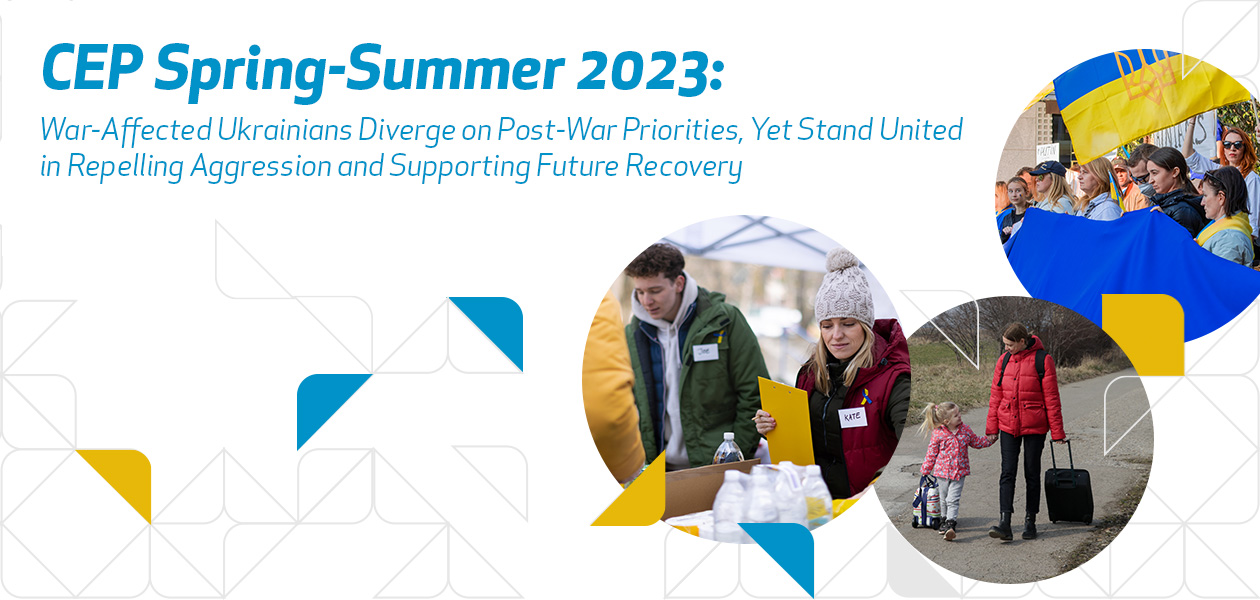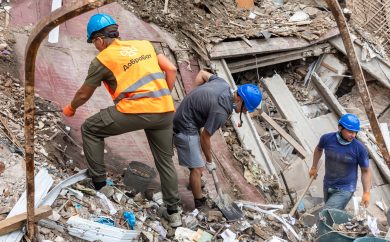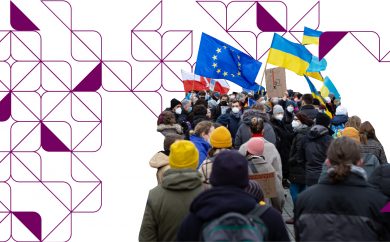USAID/ENGAGE presents the key findings of its spring-summer 2023 Civic Engagement Poll (CEP). The CEP is a means to assess how different war-affected contexts influence awareness of and engagement in civil society activities, as well as the understanding and perception of reform processes in Ukraine. Additionally, the Poll aimed to gauge the overall level of civic knowledge. The survey encompassed two primary groups: adult non-displaced Ukrainians residing within Ukraine (NDPs) and adult Ukrainians who were externally displaced abroad due to the war (EDPs). For analysis purposes, an additional sample of internally displaced persons (IDPs) was disaggregated from the NDP sample based on their displacement within the country.
The polling data analysis revealed the following:
- Ukrainian NDPs, IDPs, and EDPs are more actively engaged in the life of their communities than in the activities of civil society organizations (CSOs). Awareness of work done by CSOs does not directly lead to citizen participation in their activities. Among the three groups, but particularly among displaced Ukrainians, the significant factor hindering participation in CSO activities is a lack of knowledge on how to engage with CSOs. Compared to NDPs and IDPs, EDPs are the least likely to indicate trust in CSOs or believe in their effectiveness when it comes to influencing government decisions or addressing social issues; however, their participation in CSO activities is the highest. While Ukrainians who did not move outside of the country tend to report more confidence in CSOs and their role in ensuring the democratic development of the country, they are more prone to associate civil society work with negative narratives.
- Irrespective of their place of residence, respondents demonstrate an unwavering determination to resist the aggressor, with higher awareness and participation in civil resistance activities compared to other forms of civic participation.
- Ukrainians from each of the three groups believe that the nation’s post-war priorities do not correspond with that of their own. Speaking about their own post-war priorities, respondents would want to get their lives back on track when it comes to income generation and housing, while the state is expected to focus on fighting corruption, restoring infrastructure, and recovering the economy. In the future, respondents from all three groups are less likely to financially support the activities of CSO watchdogs but are ready to donate money to recovery efforts.
- The survey results indicate varying levels of awareness of government reforms among NDPs, IDPs, and EDPs. Among externally displaced Ukrainians, a relatively higher level of awareness regarding government reforms was observed, although they showed the least understanding of the specifics of these reforms. Overall, EDPs are the most civically knowledgeable among the three surveyed samples.
The findings of the CEP present a nuanced image of the Ukrainian public’s perspective. A notable aspect is the unwavering determination of Ukrainians from all groups—whether non-displaced, internally displaced, or externally displaced—to resist aggression and contribute to their nation’s well-being.
Across all segments, there’s a profound awareness and participation in civil resistance activities, reflecting a collective sense of responsibility. Volunteering and financial donations to support war-related causes are predominant forms of civic participation, with the majority acknowledging their knowledge of such opportunities. The study reveals a particular emphasis on the importance of employment, infrastructure renovation, and tackling corruption in the post-war scenario. The divergence in post-war priorities between national and personal perspectives provides a fascinating insight into the layered concerns Ukrainians harbor.
Yet, despite the commendable levels of awareness and participation in various civic areas, the survey underscores two areas that are less treaded: reporting on damages to cultural sites and environmental war crimes, and a deeper engagement with civil society organizations working towards government accountability, reforms, and EU integration.
Lack of Knowledge on How to Participate in CSO Activities Presents Major Challenge for Civic Engagement and Building Trust in CSOs
ENGAGE data shows that Ukrainians in all three groups are more actively engaged in their communities than in the activities of civil society organizations (CSOs). At the same time, awareness of CSOs’ work does not directly lead to citizen participation in their activities. Among the three targeted populations, but particularly among displaced Ukrainians, the primary factor hindering participation in CSO activities is a lack of knowledge on how to engage with CSOs.
Polling results indicate disparities in community-level engagement and integration among displaced Ukrainians and those who have not changed their place of residence since the beginning of the war. Fifty-three percent of NDPs reported being engaged in community-level activism. However, there is a noticeable difference in engagement levels between internally and externally displaced Ukrainians. Among IDPs, 28% were actively involved in community-based activities, while EDPs show a notably higher level of integration with 38% participating in the life of their communities. IDPs also reported disbelief in the fruitfulness of community-level engagement most often: 12% compared to 5% of EDPs and 7% of NDPs.
Among the three groups, EDPs demonstrate the highest level of engagement in CSO activities (37%). The non-displaced population is a close second with 35% engagement, while IDPs show the lowest engagement rate at 29%. While lack of time is a commonly cited reason for not participating in CSO activities by all three groups, roughly one-fifth of NDPs and nearly one-third of respondents from both displaced groups report that they did not engage simply because they did not know how to.
Awareness of CSO activities does not necessarily translate into higher participation. EDPs, who report the highest engagement rates in CSO activities, are the least aware of CSO activities – at 41%. IDPs are most aware of CSO activities (58%), but their engagement is the lowest. Comparatively, a higher percentage of NDPs (51%) are aware of CSOs’ work than EDPs, but their engagement with civil society groups is lower when compared to externally displaced Ukrainians.
Among the three groups of respondents, EDPs are the last to indicate trust in CSOs or believe in their effectiveness when it comes to influencing government decisions or solving social issues. While NDPs and IDPs tend to report more confidence in CSOs and their role in ensuring the democratic development of the country, they are more prone to associate civil society work with negative narratives.
37% of EDPs agree that CSOs are trustworthy enough to participate in or support their activities, compared to 59% of the non-displaced population and 60% of IDPs who hold a more positive view. Furthermore, EDPs are the least likely to believe that building a democratic Ukraine is impossible without CSOs, with only 78% agreeing, compared to 89% of those residing in Ukraine.
When it comes to the perception of CSOs’ influence, EDPs again rank the lowest. 49% of externally displaced respondents believe that CSOs can influence government decisions, whereas 63% of NDPs and 57% of IDPs share this belief. Additionally, EDPs are less inclined to think that CSOs are more effective in solving social issues than business or government entities, with only 44% agreeing, compared to 50% among the non-displaced population and IDPs.
EDPs show a different perspective regarding some negative narratives associated with CSOs. Representatives of this sample are less likely to believe that CSOs prioritize donor funding over solving social issues, with only 33% holding this view, while 49% of NDPs and 43% of IDPs think so.
EDPs also perceive CSOs as less corrupt, with 42% believing corruption is widespread among CSOs, compared to 61% of NDPs and 57% of internally displaced Ukrainians. At the same time, EDPs who are less prone to agree with negative stereotypes about CSOs are the most knowledgeable about their work – only 33% of EDPs admitted having little familiarity with CSO activities, compared to 47% of the non-displaced population and 40% of IDPs.
Ukrainians Demonstrate Strong Awareness of Civil Resistance Amid Aggression, Yet Reporting on War Crimes Remains Uncharted Territory
Irrespective of their place of residence, respondents from all three groups demonstrate unwavering determination to resist the aggressor, with higher awareness and participation in civil resistance activities compared to other forms of civic participation.
The survey findings highlight that volunteering and financial donations to support the army and war-affected populations are widely known forms of civic participation across all three survey samples. An overwhelming majority of Ukrainians are aware of these opportunities, with 92% of the non-displaced population, 89% of IDPs, and 78% of EDPs acknowledging the option of volunteering for the army or to support IDPs or other war victims.
Similarly, awareness of the option to donate money to support resistance against Russia’s aggression or address its consequences is high across all groups, with 83% of NDPs, 82% of IDPs, and 80% of EDPs being aware of this possibility.
Survey participants also exhibited a high level of awareness regarding reporting Russia’s acts of ecocide and damage to cultural sites. However, Ukrainians residing abroad showed relatively lower levels of awareness about these avenues of civic participation. Among EDPs, 56% are aware of how to report Russia’s crimes against the environment, compared to 78% among NDPs and 75% of IDPs. A similar situation is observed for reporting damage to cultural heritage, with 55% awareness among EDPs, as compared to 77% among NDPs and 73% of IDPs.
Interestingly, fact-checking war-related information stands out as the sole form of civic participation where externally displaced Ukrainians demonstrate higher levels of awareness compared to both samples residing in Ukraine. Specifically, 78% of EDPs are aware of this opportunity, compared to 77% among NDPs and 68% among IDPs.
In terms of actual participation, monetary donations to the army and people affected by the war is the most preferred form of civic engagement for all three groups of respondents. Ukrainians residing abroad displayed similar and even slightly greater generosity, with 71% of EDPs sending money to support the resistance, compared to 70% of NDPs and 67% of IDPs. Volunteering is the second most popular avenue for civic participation, with 63% of NDPs, 53% of IDPs, and 55% of EDPs joining the volunteer movement.
Fact-checking war-related information emerged as the third most popular form of civic participation. War-affected individuals, specifically the EDPs, demonstrated the highest level of engagement in this regard at 65%. In contrast, 49% of NDPs and 50% of IDPs engaged in this form of civic activism.
Despite the high awareness levels, reporting on damages to cultural sites and war crimes against the environment remain the least explored areas of war-related civic participation for all three surveyed samples. Specifically, 11% of EDPs reported war crimes against the environment, compared to 10% among both NDPs and IDPs. 12% percent of EDPs reported damage to cultural sites, compared to 11% of IDPs and 9% among the non-displaced population.
Notably, despite the enacted martial law, 18% of NDPs and 12% of internally displaced Ukrainians reported their involvement in peaceful assemblies within the last 12 months.
Ukrainians Express Willingness to Contribute Financially to Recovery Efforts, but Prioritize Infrastructure Renovation Over Civic Oversight Initiatives
Ukrainians from all survey groups believe that the nation’s post-war priorities differ from that of their own. Respondents are less likely to financially support the activities of CSO watchdogs but are ready to donate money to recovery efforts.
When asked to identify priority issues to be resolved after the war, respondents from all three survey samples highlight employment as the top concern. NDPs (20%), IDPs (29%), and EDPs (37%) all prioritize the restoration of employment opportunities. Additionally, NDPs emphasize income/financial position (18%) and physical health (13%) as crucial post-war issues. On the other hand, reconstruction of their city ranks high for both IDPs (27%) and EDPs (18%).
Tackling corruption is a top post-war priority for Ukraine according to the opinion of EDPs (40%), while NDPs (32%) and IDPs (30%) rank it second. Restoration of infrastructure takes precedence as a top Ukraine priority for those who have remained in the country, with 49% of IDPs and 47% of the non-displaced population expressing this concern. Economic recovery ranks as the third top priority across all three groups of respondents, with 22% of the NDPs, 24% of EDPs, and 28% of IDPs considering it crucial for the country.
Regarding future financial support, the survey reveals that significantly fewer respondents from all samples are ready to donate money to civil society organizations that promote government accountability and promote reforms and EU integration. 51% of NDPs, 49% of IDPs, and 44% of EDPs express a willingness to contribute to such causes. In contrast, a larger proportion of respondents are prepared to support specific post-war recovery initiatives. This includes financially supporting the reconstruction of infrastructure (75% NDPs, 75% IDPs, and 68%EDPs), restoration of damaged cultural heritage (74%, 73%, and 64%), addressing environmental issues (78%, 79%, and 73%), or facilitating the rehabilitation of war veterans and others affected by war (91%, 88%, and 87%).
Overall, externally displaced Ukrainians demonstrate the least readiness to donate money to various causes aimed at facilitating post-war recovery.
Ukrainians Demonstrate Varying Levels of Reform Awareness and Civic Knowledge but Are Equally Puzzled by the Structure of Local Government
The survey results indicate varying levels of awareness of government reforms among the three groups of respondents. Among externally displaced Ukrainians, a relatively higher level of awareness regarding government reforms was observed, although they showed the least understanding of these reforms. Overall, EDPs are notably more civically knowledgeable than NDPs or IDPs.
53% of EDPs declared they were aware of government reforms, compared to 50% of NDPs and 46% of IDPs. With regard to education reform, EDP awareness was 61% vs 41% of NDPs and 45% of IDPs. However, in other reform areas, EDPs exhibited a poorer understanding compared to Ukrainians residing in the country. This includes administrative, healthcare, land, and anti-corruption reforms. By contrast, IDPs displayed the highest level of knowledge about healthcare reform, with 59% indicating awareness. In comparison, awareness levels reached 55% among NDPs and 52% among EDPs.
As part of the survey, respondents were asked 13 knowledge-based questions concerning the basics of state functioning, and citizens’ fundamental rights and responsibilities. With the exception of the wartime regulation of the right to peaceful assembly in Ukraine, EDPs demonstrate considerably higher civic knowledge than NDPs and IDPs – 32% provided correct answers compared to 18% among both NDPs and IDPs. At the same time, respondents from all surveyed samples faced challenges with identifying local bodies of executive power. Only 10% of NDPs, and an equal share of 14% among EDPs and IDPs, managed to provide the correct answer to this question.
_______________________________________________________________________
This survey summary was prepared by Pact as part of the USAID/ENGAGE activity, which is funded by the United States Agency for International Development (USAID). The contents of this survey summary are the sole responsibility of Pact and do not necessarily reflect the views of USAID or the United States Government.
About the CEP
The Civic Engagement Poll (CEP) is conducted under the framework of the Enhance Non-Governmental Actors and Grassroots Engagement activity (USAID/ENGAGE), implemented by Pact. This report summarizes key takeaways from the poll, drawing from survey data collected in the spring-summer of 2023 by the research agency, Info Sapiens.
Under USAID/ENGAGE, the CEP has been conducted since 2018 and gauges citizen awareness of and engagement in civil society activities, as well as citizens’ participation in and perception of reform processes in Ukraine. During the most recent survey, respondents were also asked questions about their involvement in resisting Russia’s aggression and priorities for post-war reconstruction. In this installment of the CEP, data was collected in two samples among Ukrainians residing in Ukraine and those who have moved abroad due to the war (EDPs). Ukrainians residing in Ukraine were disaggregated from those who have moved to another city/oblast after February 24, 2022, due to the war (IDPs) and those who did not (NDPs).
To collect the data for the Ukrainians residing in Ukraine, sample telephone interviews were conducted with Ukrainian citizens aged 18 years and older. The survey sampled 2,017 respondents and was designed in accordance with the distribution of the adult population of Ukraine by age, sex, oblast, and settlement type according to the data of the State Statistics Service of Ukraine as of January 1, 2019 (excluding Crimea and non-government-controlled areas of the Donetsk and Luhansk Oblasts). The margin of error of the sample is 2.2% (excluding the design effect). For analysis purposes, 248 IDPs and 1,769 NDPs were disaggregated from this sample based on the displacement within the country as a result of the war.
During the data collection stage, the survey was also conducted with citizens from Ukraine aged 18 years old and older seeking temporary protection (EDPs) in Poland, Germany, the Czech Republic, and Italy. The survey sampled 1,002 respondents. For this sample, online interviews were conducted with links to the online questionnaire sent by SMS to potential respondents randomly. The sample design corresponds to the distribution of refugees by country, according to the data provided by UNHCR. The margin of error does not exceed 3.1%.


